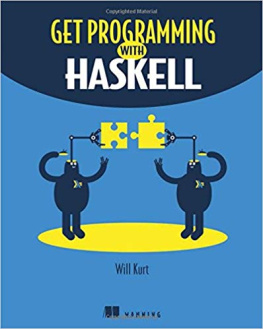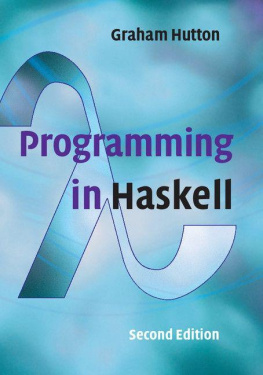Ryan Lemmer - Haskell Design Patterns
Here you can read online Ryan Lemmer - Haskell Design Patterns full text of the book (entire story) in english for free. Download pdf and epub, get meaning, cover and reviews about this ebook. year: 2015, publisher: Packt Publishing - ebooks Account, genre: Computer. Description of the work, (preface) as well as reviews are available. Best literature library LitArk.com created for fans of good reading and offers a wide selection of genres:
Romance novel
Science fiction
Adventure
Detective
Science
History
Home and family
Prose
Art
Politics
Computer
Non-fiction
Religion
Business
Children
Humor
Choose a favorite category and find really read worthwhile books. Enjoy immersion in the world of imagination, feel the emotions of the characters or learn something new for yourself, make an fascinating discovery.

- Book:Haskell Design Patterns
- Author:
- Publisher:Packt Publishing - ebooks Account
- Genre:
- Year:2015
- Rating:5 / 5
- Favourites:Add to favourites
- Your mark:
Haskell Design Patterns: summary, description and annotation
We offer to read an annotation, description, summary or preface (depends on what the author of the book "Haskell Design Patterns" wrote himself). If you haven't found the necessary information about the book — write in the comments, we will try to find it.
Take your Haskell and functional programming skills to the next level by exploring new idioms and design patterns
About This Book- Explore Haskell on a higher level through idioms and patterns
- Get an in-depth look into the three strongholds of Haskell: higher-order functions, the Type system, and Lazy evaluation
- Expand your understanding of Haskell and functional programming, one line of executable code at a time
If youre a Haskell programmer with a firm grasp of the basics and ready to move more deeply into modern idiomatic Haskell programming, then this book is for you.
What You Will Learn- Understand the relationship between the Gang of Four OOP Design Patterns and Haskell
- Try out three ways of Streaming I/O: imperative, Lazy, and Iteratee based
- Explore the pervasive pattern of Composition: from function composition through to high-level composition with Lenses
- Synthesize Functor, Applicative, Arrow and Monad in a single conceptual framework
- Follow the grand arc of Fold and Map on lists all the way to their culmination in Lenses and Generic Programming
- Get a taste of Type-level programming in Haskell and how this relates to dependently-typed programming
- Retrace the evolution, one key language extension at a time, of the Haskell Type and Kind systems
- Place the elements of modern Haskell in a historical framework
Design patterns and idioms can widen our perspective by showing us where to look, what to look at, and ultimately how to see what we are looking at. At their best, patterns are a shorthand method of communicating better ways to code (writing less, more maintainable, and more efficient code).
This book starts with Haskell 98 and through the lens of patterns and idioms investigates the key advances and programming styles that together make modern Haskell. Your journey begins with the three pillars of Haskell. Then youll experience the problem with Lazy I/O, together with a solution. Youll also trace the hierarchy formed by Functor, Applicative, Arrow, and Monad. Next youll explore how Fold and Map are generalized by Foldable and Traversable, which in turn is unified in a broader context by functional Lenses. Youll delve more deeply into the Type system, which will prepare you for an overview of Generic programming. In conclusion you go to the edge of Haskell by investigating the Kind system and how this relates to Dependently-typed programming.
Style and approachUsing short pieces of executable code, this guide gradually explores the broad pattern landscape of modern Haskell. Ideas are presented in their historical context and arrived at through intuitive derivations, always with a focus on the problems they solve.
Ryan Lemmer: author's other books
Who wrote Haskell Design Patterns? Find out the surname, the name of the author of the book and a list of all author's works by series.


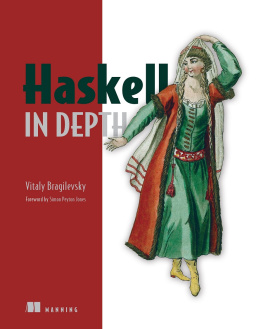
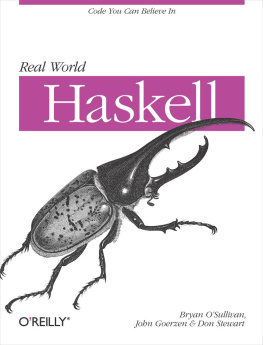
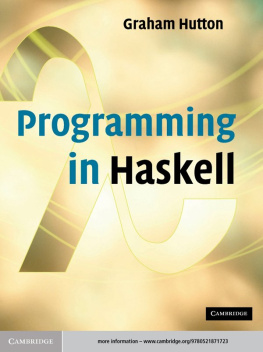
![Will Kurt [Will Kurt] - Get Programming with Haskell](/uploads/posts/book/116897/thumbs/will-kurt-will-kurt-get-programming-with-haskell.jpg)
